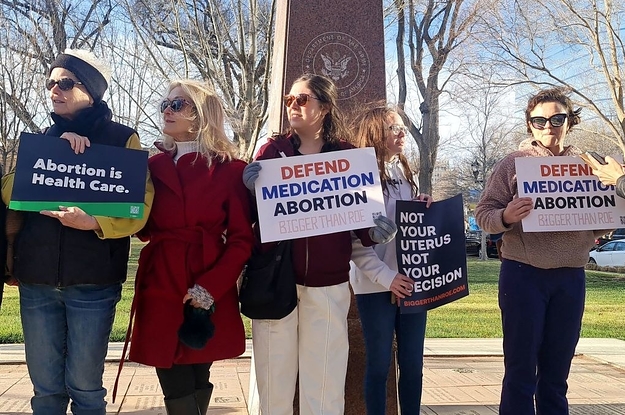Knowing the abortion pill case was likely to spark public outrage, Kacsmaryk took extraordinary measures to keep proceedings under wraps: Typically, details on federal court cases are released on a publicly available docket. But in a conference call with lawyers on March 10, Kacsmaryk said he would try to delay the hearing’s announcement until the night before. However, the Washington Post learned of the call a day later, giving the public warning of the upcoming hearing.
During the hearing on March 15, according to the Washington Post, Kacsmaryk appeared open to the anti-abortion group’s claims that mifepristone could be harmful or even deadly, and that the FDA approval process had been rushed.
“How many more women have to die?” the anti-abortion group’s attorney, Erik Baptist, asked during the hearing, according to the Lubbock Avalanche-Journal.
In reality, scientific evidence categorically demonstrates that mifepristone is safe. As of 2018, FDA data shows, 24 people out of 3.7 million have died after taking mifepristone, though their deaths could not be conclusively tied to the drug. Department of Justice attorneys, who defended the FDA, said 99.9% of mifepristone users show no major side effects.
Ordering a ban on an FDA-approved drug — particularly one so widely used for over 20 years — would be an unprecedented decision. Acknowledging this, Kacsmaryk asked Baptist if he was aware of any other rulings that have taken a drug off the market, according to the Associated Press. There were none, Baptist said, but he contended that this was due to the FDA “stonewalling” previous challenges to the drug.
In a “normal world,” Lorie Chaiten, senior staff attorney at the American Civil Liberties Union’s Reproductive Freedom Project, told BuzzFeed News ahead of the March 15 hearing, the anti-abortion group’s lawsuit would have been thrown out from the get-go. The fact that it wasn’t shows we’ve entered “uncharted waters,” she said.
“What the plaintiffs have asked for here is unprecedented,” Chaiten said. “Courts just simply do not jump in and remove drugs from the market, particularly not ones that have been on the market for [23 years].”
Ahead of the arguments in the Texas case, Democratic-led states sued the FDA in late February in the US District Court for the Eastern District of Washington. The complaint primarily asked the court to order the agency to remove an extra layer of restrictions on mifepristone. But it also sought a ruling enjoining the agency “from taking any action to remove mifepristone from the market or reduce its availability.” On Friday, District Judge Thomas Owen Rice, an appointee of Barack Obama, did just that, finding that a preliminary injunction was in the public interest.
Still, Rice wrote that a nationwide injunction in this case was “inappropriate,” citing the competing litigation in Texas.
While it remains unclear how the Supreme Court will sort out the differences in the two opinions, the impact of Kacsmaryk’s ruling stands to be felt nationwide — if it is allowed to take effect.
“Even in states where abortion is legal, if it’s an unapproved drug, there could be legal repercussions for continuing to prescribe it and certainly for these sponsors to continue to distribute it,” Chaiten said.
David Mack and Stephanie K. Baer contributed reporting to this story.


